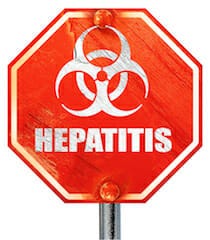Protect Yourself From Emerging Health Threats
Until 2014, I had gone 25 years without getting sick from a suspect. I wasn’t a germaphobe, but I felt I did a pretty good job at protecting myself from the heebee jeebees that infect so many people we encounter on duty. Whenever I encountered someone with TB, I would dutifully put on my mask and wear nitrile gloves. If I searched a heroin addict, I would always clean up afterwards with an alcohol based hand sanitizer.
My luck came to an end in 2014. I was helping Animal Control serve a search warrant at an apartment. The suspect was less than clean and I ultimately contracted MRSA from that suspect during the investigation. MRSA is an infection, like staphylococcus aureus -- or staph, but it's tougher to treat than most strains of bacteria because it's resistant to some commonly used antibiotics. I was hospitalized for 4 days trying to fight that infection.

Back in the day, the worst thing that could happen to you in the field was to get stuck by a dirty needle during a search. Now, we have threats like MRSA, which can survive for weeks on contaminated surfaces, including counter tops and steering wheels, which is just about any place a person or contaminated item has touched. We also have threats other than bacteria. Fentanyl has poisoned a number of officers in the past few months. Just like MRSA, fentanyl can be found scattered on drug paraphernalia, packaging material, or in vehicles that you are searching.
Then there are viral threats like hepatitis. There are vaccinations for hepatitis A and B, but not for Hepatitis C. If you contract hepatitis, you could be afflicted with cancer, decreased liver function or cirrhosis. Hepatitis is a hardy virus and survives in the open air and can last on surfaces, like the back seat of your patrol car. In October, the State of California declared a state of emergency over a statewide outbreak of hepatitis among drug addict and homeless after 18 people died from the disease. This is a segment of the US population that street cops deal with on a regular basis.
These threats attack us on multiple fronts; from contact to our skin (like MRSA) or inhalation threats like fentanyl. Now more than ever it is important for you to protect yourself. So, what can you do to protect yourself? Here’s 3 simple ways that you can protect yourself from these threats and how you can decontaminate your equipment.

Wear proper protective equipment (PPE)
Our PPE has changed with these new threats. We used to be satisfied wearing latex gloves, but that doesn’t go far enough anymore. It’s time to ditch the latex gloves and switch to nitrile gloves. Unfortunately, latex gloves don’t provide enough protection from fentanyl. Now experts suggest using nitrile gloves instead. You should also wear a fit tested N95 mask to protect your respiratory system. Not only does it protect you from airborne threats like fentanyl, it also protects you from TB and other airborne viruses.
Decontaminate Any Equipment That Might Be Contaminated
So, you arrested a suspect that has MRSA and you put him in your back seat? The patrol car will need to be decontaminated, so will your handcuffs and maybe even your clothes. How are you going to do that? There are several products available that you can use to decontaminate your patrol car. Ensure that you are wearing nitrile gloves, at least an N95 mask and something to protect your uniform and skin and your eyes. There are several products available that you can use to spray down the inside of your patrol car and make it safer for you and anyone else that may use your patrol car.
Be Cautious of Hand Sanitizers
Hand sanitizers come in different forms. When I came in contact with my suspect that had MRSA, I dutifully washed down with my department issued hand sanitizer. Unfortunately, I did not know that my agency stopped using alcohol based hand sanitizer because someone complained about the harshness of the alcohol on their skin. Not having an alcohol based hand sanitizer allowed the MRSA bacteria to stay on my skin. To avoid this happening to you, make sure that your hand sanitizer is alcohol based. However, if you suspect that you are at the scene where fentanyl can be found, DO NOT USE AN ALCOHOL BASED HAND SANITIZER! Alcohol based hand sanitizers will accelerate the absorption of fentanyl into your skin and poison you quickly. If you need to decontaminate your skin from possible fentanyl exposure, you should wash the affected skin with soap and water for 15 minutes. I recommend officers keep one gallon of water in their trunk, along with soap, for just this purpose. Most agencies already have a gallon jug of water in their trunk to decontaminate suspects exposed to OC, so you can kill two birds with one stone with this tactic.
It is a brave new world for officers on the street. We can still do our job when we deal with these threats, we just have to be smarter about protecting ourselves from these threats and smarter in decontaminating our equipment. Don’t be afraid of these invisible threats, just make sure that you protect yourself while you are out protecting this great nation.


